Summercamp 2009
Learning Centers Network Summer Program
| Title: | Learning Centers Network Summer Program | |
| Aim: | To ensure that children attending the Learning Centers use the summer holiday to be prepared to enter and succeed in their next school year. | |
| Objectives: |
|
|
| Locations: | Fushe Kosova, Gracanica, Plemetina, Shtime | |
| Duration: | Program 29 June to 14 August 2009; training 22-26 June | |
| Beneficiaries: | Direct beneficiaries 700 children will benefit directly from their learning in the Summer Program. 82 Learning Centers staff will be trained and gain valuable experience in pedagogic methods.
Indirect beneficiaries - Parents and families of the children benefit. The wider community in the four locations will also benefit from a better educated minority populace and improved interethnic relations. |
|
| Grant Request: | € | |
| Contact details: | Balkan Sunflowers (BSF)
Tim Armstrong tim.armstrong@ balkansunflowers.org 381-38-246-299, 377-44-501-819 |
Balkan Sunflowers Kosova (BSFK)
Muhamet Arifi muhamet.arifi@ balkansunflowers.org 381-38-246-299, 377-44-418562 |
Roma, Ashkali and Egyptian 1 communities in Kosovo are generally poorly educated. According to the 2007 European Union Progress Report on Kosovo, less than half of eligible Roma, Ashkali and Egyptian children are attending primary school. Fewer than 20% attend school past age 12; only 4.5% have completed secondary school, and only around 40 students from Kosovo's 39,000+ Roma, Ashkali and Egyptian citizens are enrolled in post-secondary studies 2 .
Minority children attending school often experience social and academic difficulties. They are discriminated against by their peers and also sometimes by their teachers. Roma children attend school in a language which is not their mother tongue a disadvantage from the very beginning of their school career. Although Ashkali and Egyptian children speak Albanian, they often have problems with the language taught in schools because of the colloquial language spoken in their homes and surroundings.
Education is a fundamental need for social and economic freedom. International and local sources amply demonstrate the need for programs to support vulnerable children, particularly minority communities, if children are to have a chance to break the cycle of poverty and exclusion. The project reinforces the impact of the regular Learning Centers Network program in helping these children to succeed in school. Inclusive education is the first step towards making a long lasting and positive change to the situation of Roma, Ashkali and Egyptian communities in Kosovo.
In February 2008, and building on more than seven years experience with education in Kosovo Roma, Ashkali and Egyptian communities, Balkan Sunflowers opened the Learning Centers Network. The project supports the learning of Roma, Ashkali and Egyptian children so that they are able to participate on a more equal footing with their Albanian and Serbian peers in school. The Network will expand as funding allows and currently includes four centers, and one sub-center. The centers are located in Fushe Kosova, Gracanica, Plemetina, and Shtime. The regular program in each center consists of five elements: Pre-Primary, Language Club, Homework Assistance, Peer Tutoring and Community Outreach. As well as a shared program and methodology, Center Coordinators meet on a regular basis to discuss common opportunities and concerns, and to develop a joint strategy. Centers also have the benefit of all the resources that Balkan Sunflowers can bring to the program.
The Summer Program adapts the Learning Centers activities to continue to support the children and their learning process over their school holiday. The regular program of the Learning Centers Network assists children with learning the required work for school through, for instance, Homework Assistance. The Summer Program will use varying methods to ensure that the children's previous years' requirements are well-understood making a solid foundation for the coming year. During the Summer Program, Homework Assistance will be replaced by exercises and games covering material from the children's previous year. Children entering first grade in the fall receive vital help in developing appropriate social and hygiene skills, and learning numbers and letters for first grade.
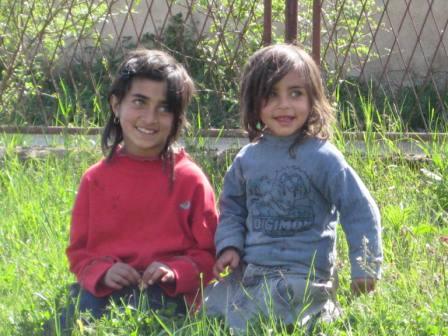
| Aim: | To ensure that children attending the Learning Centers use the summer holiday to be prepared to enter and succeed in their next school year. |
| Objectives: |
|
The overall aim of the summer program is to ensure that the children improve their academic level over the summer holiday. The summer program will provide an entertaining and interactive environment where children will not only be prepared to enter the coming school year, but will also be motivated and enthused about their own educational and learning capacities. As well as curriculum review, extracurricular and fun activities will be arranged for the children.
Staff Training. Staff training will occur 22-26 June, the week prior to the beginning of the Summer Program. Albanian speaking staff in Fushe Kosova and Shtime will train together, and Serbian Speaking staff from the Plemetina and Gracanica centers will train together. As this is the second summer of the Summer Program, many staff have a lot of experience in planning and implementing the program. The second summer builds on this experience.
The training will build the capacity of staff members to take on responsibilities during the course of the Summer Program, and empower them to move closer towards being able to fully plan and implement such a program in the future. The training focuses on non-formal pedagogic methods so that staff may use these methods to assist children to be successful in more formal learning situations such as school.
The training ensures that staff grasp the structure and daily requirements of the Summer Program and instils the importance and use of the Learning Centers Network methodology. Staff will train in games and activities that can be carried out with the children.
Summer Program. The program will be set up slightly differently in each community, due to situational differences, such as available resources, facilities, number of staff and of children. The program in each center, however, and as overall in the Learning Centers Network, will implement the same format and methodology.
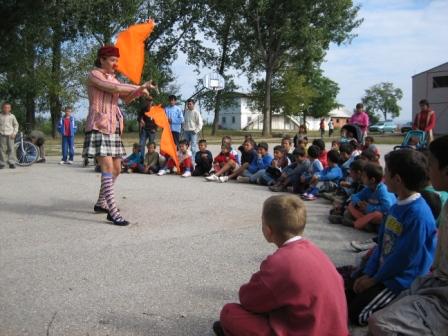
In each community, children will attend the Summer Program in shifts. This will make sure that age and ability differences amongst the children are accommodated, and will also ensure that the ratio of children to tutor or facilitator does not exceed that needed for a workable child-centered learning environment. (Ratios are dependent on age groups and activity.)
Each Center will provide activities, games and learning exercises which will be divided into activity areas. Core activity areas include Mathematics, Language (either Albanian or Serbian), Sports and Arts. Other activity areas, dependent on community interests will include English, Environment, Health and Hygiene. Tutors will be specialised in one or two specific areas of activity and will support children in their particular area throughout the summer.
The daily routine of the Summer Program will include a pre-primary program for pre-school aged children as it would during the regular program of the Learning Centers Network. For school-aged children, four to five activity areas will be provided each day (dependent on community size and resources). Children attending each shift of the Summer Program will be split into small groups of ten to fifteen. These groups will rotate around the different activity areas available for the day, meaning that they will cover material in four-five different interests. Two or three tutors and volunteers will guide each group of ten to fifteen through the activity prepared for the day.
The morning shift of each center will run from 9 am to noon. The afternoon shift will run from 2 to 5 pm. A healthy snack will be served mid-morning and mid-afternoon. For many children from these poor families, this is vital.
Language, Math, Social Skills. The primary needs and obstacles for most children are their ability to speak comfortably in the language of instruction, to understand basic math skills, to be able to solve problems, and to develop the social skills to be comfortable with other children, particularly the majority children, in the classroom. These elements are the primary focus of the summer program.
Methodology. The Summer Program, as with the whole of the Learning Centers Network, will apply a child-centered and community-based approach to learning. This approach to learning is fundamentally democratic and human rights oriented. It inspires members from RAE communities to take proactive roles in bettering their situation.
Child-Centered Learning. In this approach, the child is the main focus of the learning process. The learning is determined by the child's needs. Children are seen as active participants in their own learning processes. This approach empowers children, and increases their self-confidence and esteem, which is particularly important in the case of children who are discriminated against and marginalized.
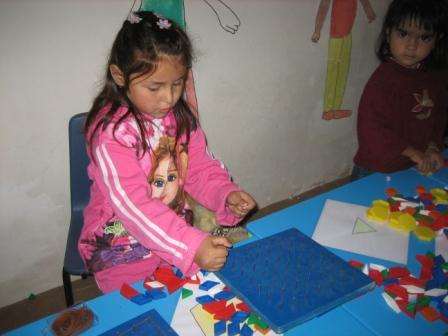
Community-Based Learning. In a community-based approach to learning, those with a direct or indirect influence over children's lives and futures parents, families, schools, local authorities and role models are called on to join in meetings, discussions and exchanges concerning the children's learning, and to contribute in other capacities as appropriate. More practically for the Summer Program, youth are encouraged to take part in the peer tutoring program. Youth support and assist younger children through the learning process, thereby actively participating in the community, gaining confidence and becoming more interested and engaged in their own education. Past experience has demonstrated that tutors develop a strong sense of team belonging and self-esteem through their mentoring. This is an important means of inspiring social change.
The success of the programs will be constantly monitored by the staff of the Learning Centers. Quantitative indicators used for evaluation will include the number of children attending the Summer Program, and the number of children attending the different grades of school. Qualitative indicators will include the individual assessments of children which are a part of the Learning Center Network program. Assessments will take place in August or early September at the end of the Summer Program.
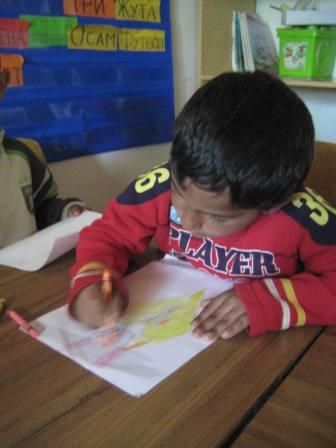
Balkan Sunflowers is looking for volunteers for our ..
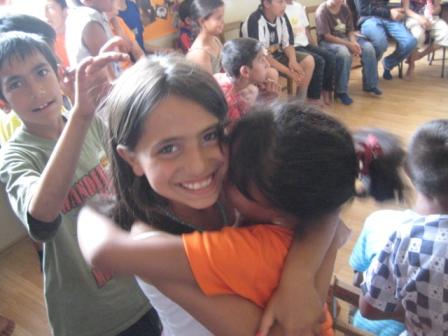 |
|---|
Learning Centres Network SUMMER PROGRAM!!
From June 15 th to August 14 th 2009
Balkan Sunflowers has been effectively working with minority groups in Kosovo for the last seven years. In 2008, Balkan Sunflowers launched the Learning Centres Network (LCN). This educational program is now running in four locations around Pristina and helps 600-700 Roma children each day. The Summer Program aims to ensure that the children have the opportunity and support needed to stand on an equal footing with their Serbian and Albanian peers in the school system. The Summer Program is fun, entertaining and interactive.
Volunteers live with a Roma host family in one of the four minority communities we are working in (Fushe Kosova, Plemetina, Shtime and Gracanica). Power cuts and water shortages in these communities are not uncommon! Still, previous volunteers have found their experiences in these communities to be rich, enjoyable and valuable. Throughout the program you will have the opportunity to participate in the education of the children and make strong and lasting friendships!
Applications from experienced educators, pedagogs, people with knowledge of local languages or experience in grassroots community education projects are particularly welcome. We would be happy to hear from anyone, however, who feels they would be able to contribute in a practical and useful way - with a proactive and positive attitude.
Applicants must be 18 years or older. To cover the cost of food and accommodation with the host family, volunteers need to pay 200 euro per month (or 400 euros in total). This payment does not include your own personal travel and expenses.
For more information see:
http://www.youtube.com/watch? v=n50bNBLvFtQ
Contact;
Summer Program Coordinator
Tim Armstrong
tim.armstrong@ balkansunflowers.org
Balkan Sunflowers
Youth, Culture and Sports Hall 114
Luan Haradinaj Street
Prishtina, Kosovo
+381-38-246299
+377-44-614598